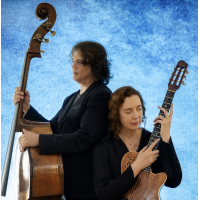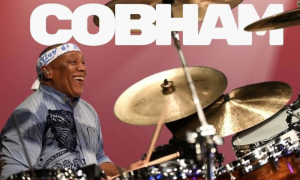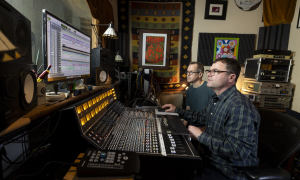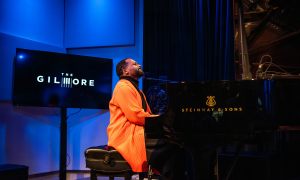In 1921, 16-year-old trumpet student Elden E. Benge of Winterset, Iowa, wrote a letter to Herbert L. Clarke (pictured, right), asking advice. Clarke (1867-1945) was the most celebrated cornet soloist of his day, a veteran of John Phillip Sousa’s band and leader of his own concert bands. His recordings of marches and adaptations of classical pieces rang out in living rooms in the days when Victrolas were the iPods of the early twentieth century. Clarke’s method books of technical and characteristic studies are staples in the libraries of cornetists and trumpeters to this day.
Thanks to classical violinist Brian Lewis for sending a photocopy of Clarke’s reply to young Benge. It was on the letterhead of the Anglo Canadian Leather Co. Band of Huntsville, Ontario, Canada. I retain Clarke’s punctuation and spelling.
I don’t know whether Elden Benge (pictured, left) took to heart Clarke’s warning about jazz, but he ignored the great man’s contempt for the trumpet. From 1928 to 1933, he was principal trumpet of the Detroit Symphony Orchestra, then accepted the same position withthe Chicago Symphony. In Chicago, he began designing a new trumpet and by the end of 1935 had made one for his own use. By 1937, he was making trumpets at home and selling them. Two years later he formed the Benge company and continued to make and sell trumpets after he moved to California in 1953. He did little advertising; his trumpets sold through word of mouth among professionals about the quality of Benge horns made in Burbank. According to trumpet expert Jim Donaldson, “a new Benge trumpet arrived by REA Railway Express and came in a cardboard box, protected by wadded up newspaper padding. No case and no mouthpiece were included.” After Benge died in 1960, the company changed hands more than once. Benge trumpets were made for a time by the Conn-Selmer company, but production of most models dwindled, then ceased in 2005. Today, most trumpets with Benge characteristics are made by other companies.
Thanks to classical violinist Brian Lewis for sending a photocopy of Clarke’s reply to young Benge. It was on the letterhead of the Anglo Canadian Leather Co. Band of Huntsville, Ontario, Canada. I retain Clarke’s punctuation and spelling.
Jan. 13th, 1921
My dear Mr. Benge:
Replying to yours of the 19th just received, would not advise you to change from Cornet to Trumpet, as the latter instrument is only a foreign fad for the time present, and is only used properly in large orchestras of 60 or more, for dynamic effects, and was never intended as a solo instrument.
I never heard of a real soloist playing before the public on a Trumpet. One cannot play a decent song ever, properly, on it, and it has sprung up in the last few years like “jaz” music, which is the nearest Hell, or the Devil, in music. It pollutes the art of Music.
Am pleased that you are making improvements in your playing. Keep it up, and become a great Cornet Player. You have an equal chance with all the rest, but you must work for it yourself.
Wishing you all the best of success, I remain.
Sincerely yours,
Herbert L. Clarke
I don’t know whether Elden Benge (pictured, left) took to heart Clarke’s warning about jazz, but he ignored the great man’s contempt for the trumpet. From 1928 to 1933, he was principal trumpet of the Detroit Symphony Orchestra, then accepted the same position withthe Chicago Symphony. In Chicago, he began designing a new trumpet and by the end of 1935 had made one for his own use. By 1937, he was making trumpets at home and selling them. Two years later he formed the Benge company and continued to make and sell trumpets after he moved to California in 1953. He did little advertising; his trumpets sold through word of mouth among professionals about the quality of Benge horns made in Burbank. According to trumpet expert Jim Donaldson, “a new Benge trumpet arrived by REA Railway Express and came in a cardboard box, protected by wadded up newspaper padding. No case and no mouthpiece were included.” After Benge died in 1960, the company changed hands more than once. Benge trumpets were made for a time by the Conn-Selmer company, but production of most models dwindled, then ceased in 2005. Today, most trumpets with Benge characteristics are made by other companies.























